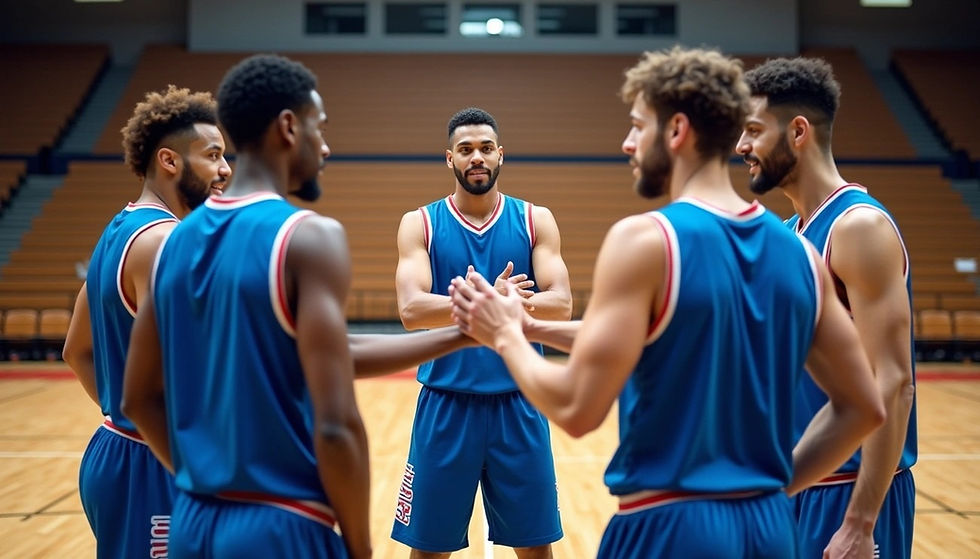Inside a Footballer's Mind: The Psychological Game
- Dr Paul McCarthy

- Jun 4, 2025
- 4 min read
Football is not just a physical sport; it's a mental battle that requires focus, resilience, and an unwavering mindset. To truly excel on the pitch, a footballer must navigate the complexities of their own mind. This blog post offers a unique glimpse into the psychological aspects of football, revealing how elite players harness their mental strategies to achieve success.
The Importance of Mental Resilience
Mental resilience is critical in football in a footballer's mind. Players face intense pressure, whether during high-stakes matches or everyday training sessions. One player who exemplifies this resilience is Cristiano Ronaldo, who often speaks about the power of mental conditioning. He focuses on visualization techniques to imagine himself succeeding on the field, which helps solidify his confidence.

Moreover, research suggests that up to 80% of performance can depend on mental strength. This statistic highlights how necessary it is for players to cultivate their psychological skills alongside their physical training. Engaging in activities like mindfulness meditation has been shown to help athletes boost focus and reduce anxiety.
The Role of Visualization and Routines
Visualization is a central technique that many footballers employ to enhance performance. Players like Lionel Messi attribute part of their success to the practice of mentally rehearsing plays and movements. This preparation can lead to improved muscle memory and focus during matches.
Establishing routines is another key strategy. Rituals like specific warm-ups or consistent pre-match meals help players elevate their game by creating a sense of control and familiarity. Furthermore, routines can help mitigate nerves and anxiety before high-pressure situations, allowing athletes to focus on their performance rather than the outcome.

Coping with Pressure and Performance Anxiety
The fear of failure is palpable in sports, especially for footballers who are constantly under scrutiny from fans, media, and coaches. To combat this pressure, players often employ techniques tailored to their needs. For example, some players use positive self-talk to reframe their thoughts and alleviate performance anxiety. More often than not, a simple phrase like "I am prepared" can shift their mindset significantly.
Additionally, sports psychologists frequently work with athletes to teach them coping mechanisms. These techniques might include breathing exercises, where deep, controlled breaths help increase concentration and decrease tension. For instance, many elite teams incorporate sports psychologists into their coaching staff to help players process their emotions effectively.
Team Dynamics and Mental Preparation
Football is a team sport, and the mental state of one player can influence the entire team. Strong team dynamics are essential for fostering a healthy environment where players support one another. The psychological aspect of teamwork encompasses communication, trust, and mental cohesion.
Teams often conduct bonding exercises that develop relationships off the pitch. This camaraderie can translate into better communication during matches. For instance, when players know each other well, they can predict movements and make split-second decisions more effectively.
The Path to Mental Mastery
Practicing mental exercises is a path toward mastery. Players can engage in various activities to enhance their mental fortitude. One effective approach is setting short and long-term goals, providing clear benchmarks for progress. For example, a striker might aim to improve their goal-scoring accuracy by focusing on one aspect of their shooting technique during each practice.
Athletes should also seek feedback and engage in reflection. Keeping a journal where they note down their thoughts, experiences, and feelings can foster self-awareness and growth. Moreover, learning from failures is an integral part of reaching mental mastery.
By embracing setbacks and utilizing them as teaching moments, footballers can cultivate resilience and a growth mindset—a crucial ingredient in the quest for success.
Cultivating a Winning Mindset
Establishing a winning mindset goes beyond mere self-belief. It requires players to create a positive environment around them. This includes maintaining healthy relationships both on and off the pitch—whether it's players supporting each other or leaning on coaches and staff for guidance.
Moreover, surrounding oneself with positivity can help instill confidence. For example, countless athletes speak on the importance of supportive family and friends throughout their careers. Their unwavering belief in the player can significantly impact performance.
Seeking Continuous Improvement
Top footballers embody the principle of continuous self-improvement. Regularly evaluating and adapting one’s daily routines is essential for growth. Engaging in workshops, attending motivational talks, and learning from mentors are all part of a footballer's journey toward excellence.
Additionally, footballers can also benefit from tracking their mental progress alongside their physical stats. Evaluating how they handled pressure situations, their emotional responses, and mindset changes can provide invaluable insights for future matches.

Pushing through setbacks, embracing challenges, and striving for personal bests can aid in fostering an attitude geared toward excellence, ultimately leading to success on the pitch.
Final Thoughts on the Psychological Edge in a Footballer's Mind
Understanding the psychological aspects of football provides insight into how players maintain peak performance. By applying mental strategies like visualization, establishing routines, and fostering team dynamics, footballers can gain significant advantages over their opponents.
The mental game is an intricate part of football that deserves attention and respect. As fans, recognizing the effort teams put into honing their minds helps us appreciate the sport on a deeper level.
For anyone interested in learning more about the psychological performance of athletes, consider exploring resources from sports psychology professionals. You can enhance your understanding of how athletes navigate their minds through challenges. Dive into articles and studies, perhaps starting with a comprehensive guide available through credible sources.
As we gain insight into the minds of footballers, we start to appreciate the sport from a uniquely different angle—a captivating fusion of skill, strategy, and psychology.








